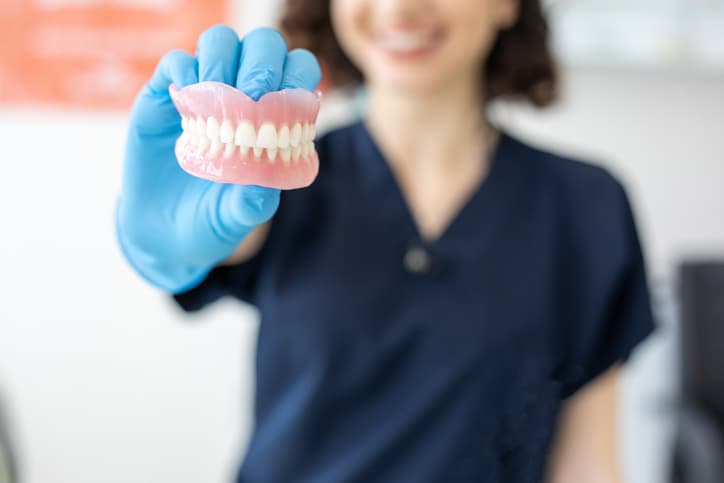 can be an important solution to tooth loss. Today’s dentures, also called false teeth, are not like the ones your grandmother wore. They are more comfortable and natural-looking than they were in the past. Still, if you don’t take proper care of your dentures, problems can occur.
can be an important solution to tooth loss. Today’s dentures, also called false teeth, are not like the ones your grandmother wore. They are more comfortable and natural-looking than they were in the past. Still, if you don’t take proper care of your dentures, problems can occur.Common Denture Problems
If you wear dentures, it is very important you keep your mouth clean and healthy. You should also only wear dentures that fit properly. Otherwise, the following problems may occur:
- Gum and mouth irritation
- Problems eating and speaking
- Dentures that move around in your mouth
- Mouth infections
Treating Denture Problems
If you have problems with your dentures, see your dentist or denturist right away. Your dentures may need to be adjusted or replaced.
Here are some ways to treat various denture problems:
Make sure your dentures fit. Over time, your gums and bones will change and your dentures won’t fit as well. When this happens, your dentures need to be adjusted, modified, or replaced. Never try to adjust your dentures yourself.
Speak slowly. When you first get dentures, it may be hard for you to say certain words. Be patient. Practice saying the challenging words aloud and speak slowly. If your dentures move around when you laugh or smile, gently bite down and swallow to put them back in place. Check with your dental professional to adjust the fit.
Eat soft foods. If you are having trouble eating, follow these tips:
- Take small bites of soft foods, such as eggs and yogurt.
- Don’t eat anything sticky.
- Chew your food slowly.
- When you chew, use both sides of your mouth at the same time. This prevents your dentures from moving forward or tipping.
Eating will become easier as you get used to your dentures. In time, you should be able to eat most foods.
Use an adhesive. Denture adhesives help your dentures stay in place and make them feel more secure. But denture adhesives should not be used to fix old or poorly fitting dentures – and should generally be avoided. When using an adhesive, follow the instructions carefully. Use only a small amount.
Mouth Infections Linked to Dentures
Some people who wear dentures get mouth infections, such as:
Cheilitis. This is a painful infection that causes inflammation and cracking at the corners of your mouth. It is caused by an overgrowth of yeast. Yeast can accumulate in moist areas of your mouth if your dentures don’t fit properly.
To prevent cheilitis (also called cheilosis), see your dentist regularly to make sure your dentures fit properly. Also, try not to rub or lick the corners of your mouth.
Stomatitis. This is another infection that is caused by too much yeast. You may not know you have denture-induced stomatitis, because symptoms are not always obvious. When symptoms are noticeable, you may see small red bumps on the roof of your mouth or general mouth redness, especially under your upper dentures.
Both cheilitis and stomatitis can be treated with medicine and proper denture care.
Caring for Your Dentures
Along with making sure they fit well, it is important to take good care of your dentures. Here are some tips to keep your dentures working and looking at their best:
Never sleep with your dentures. Unless your dentist advises you to do so for a specific time, such as after multiple extractions and initial delivery of new dentures, do not sleep with your dentures.
Handle dentures with care. Your dentures are delicate and can break easily. When holding your dentures, stand over a sink filled with water or place a towel on the counter. That way your dentures will be protected in case you accidentally drop them. Also, keep your dentures safely out of the reach of children and pets.
Clean your dentures daily. Here are some tips for cleaning your dentures:
- Soak your dentures overnight in a denture cleaner.
- Thoroughly clean them each morning before putting them in your mouth.
- Use a soft-bristled brush or special denture-cleaning brush.
- You can use plain soap and warm water or ask your dentist to recommend a denture cleaner.
- Never use powdered household cleaners or bleach on your dentures, nor toothpaste, which is too abrasive.
Clean your mouth daily. Clean and massage your gums, tongue, and roof of your mouth each day before putting in your dentures. This will help keep your mouth healthy.
